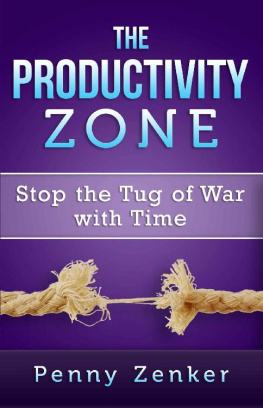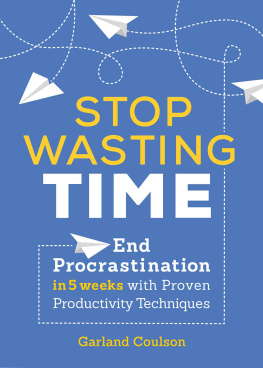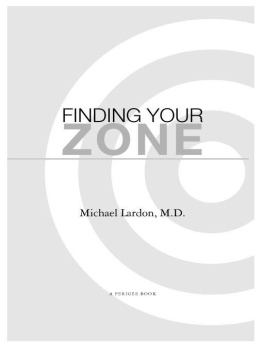
The Productivity Zone
Stop the Tug of War with Time
by Penny Zenker
with contributions from Megan Myers, PBC, MS
All rights reserved. No part of this book may be reproduced in any form or by any electronic or mechanical means including information storage and retrieval systemsexcept in the case of brief quotations in articles or reviewswithout the permission in writing from its publisher, SmartMoves Coaching.
All brand names and product names used in this book are trademarks, registered trademarks, or trade names of their respective holders. I am not associated with any product or vendor in this book.
Print Book
ISBN-13: 978-0986307508
ISBN-10: 0986307505
LCCN: 2014922291
Interior layout and design by Ellie Searl, Publishista
Consulting editor -Alan Sharavsky
Final edits by Sarah Coolidge
SmartMoves Coaching, LLC
Devon, PA
Get your FREE
Productivity Accelerator Assessment
www.p10app.com
CONTENTS
Dedication
I dedicate this book in memory of the two great men who strongly influenced both my outlook and my business results. First my father Carl Zenker, who passed away more than twenty-five years ago. When I was a child, my dad often had me help out in and around his office by adding up the ledgers, filing papers, and cutting the lawn. He taught me that earning money is easy when you fulfill a need and add value. I know he would be proud of me. I miss him. Second, Peter Hofer, the CEO of GFK Switzerland, who was my boss and mentor for seven years. Peter taught me that a great leader isnt there to motivate me, but to remove the obstacles that stand between me and my motivation.
Ultimately, I pursue this work for my childrenfor them to live life to the fullest and to achieve their hearts desires. I want them to have their cake and eat it too! I want this for all children. When we live our lives in the Productivity Zone, we reduce stress, which has become one of the biggest obstacles to success and fulfillment.
Introduction
Many of the executives I work with rate themselves as "very proficient" or at least an 8 out of 10 on their ability to manage their time. They are often surprised when they learn about 10 Core Drivers, and discover that they aren't scoring as high as they thought they would in at least a few of the elements. If I had a dollar for every time I've heard one of them say that they never realized all of these contribute to their productivity, I could retire on my own private island. The real excitement for me, is seeing how much of a difference it makes in their lives and businesses when they start managing all the drivers that contribute to their productivity, rather than just the few they had previously been aware of. These executives have reported amazing shifts in their business and lifestyle as a result.
Your life will also be different in so many ways from this point forward. You will start to think of things from a new perspective when you evaluate the importance of tasks, goals and strategies. You will ask new questions, and be aware and more in control of your self-talk. You will achieve clarity quicker more quickly and be open to see more opportunities.
You will find that you share these principles with others, and see the changes as they ripple through your home, your workplace and your community. After implementing the 10 Core Drivers of productivity, my clients not only feel twice as productive, but success comes easier and faster. They feel more balanced and in control. One client, Dr. Isaac Jones said after a session that "he would stand on his head if I told him to because everything I coached him on was spot on." His business doubled in one year and he had the systems in place to double it again year after year. Dont worry, I won't have you stand on your head. The point is, these principles work. No matter the context, they WORK. When consistently applied they will work for you, too.
Chapter 1: Where Will My Arrow Fall?

Something had to give.
My heart was pounding, and I was sweating as if I had just run a marathon. For the third night that week, I was trading sleep for worry over paying my billswhich included the salaries of my two key employees, John and Sue. I mean, John had two kids who depended on him, and Sue was taking care of her elderly mom. I couldnt let them down.
From the moment I opened the doors of my company, cash flow had been a problem. Sure, I had recently closed some new projects. But one of my biggest clients hadnt paid his bills, and I was frantic. All my liquid assets were tied up in an ongoing project that I knew would have a big payout eventually. But eventually wasnt going to pay the bills NOW. Time was a luxury I didnt have. I was working seven days a week, and more often than not, sixteen hours a day. Every single pay period I went through the same panic: Can I really ask my employees to be paid late? How long will they stay with me if I do? What will they think of me as a leader if I have to ask them to wait just one more week for their checks? I was ashamed, frustrated, and stressed out. I hadnt paid myself in months. I was burning out fast, and deeply unhappy. The stress was affecting every aspect of my life.
What happened to the dream of flexible working hours and more freedom? Why did I feel more tied down than ever? I wished someone had told me this was the cost of owning your own business.
Something had to give.

Entrepreneur Mindset
The truth is, I never intended to start my own business. I admit that I always valued money, probably more than my peers. Even as a child I was always involved in one business venture or anotherlemonade stands, paper routes, mowing lawnshow ever I could serve a need and earn a dollar or two. But the difference between my friends and me was that I was usually doing all of those things every day, day after daywhich meant I always had my own money to buy treats and toys or the spare cash to save for a rainy day. I didnt realize it back then, but I was enjoying creating my own opportunities and being my own boss.
As a young adult, I was open to any and all jobs. I worked the standard run-of-the-mill gigs: fast food counter girl (fries with that?), waitress, and six-foot sub builder. But I quickly learned that the more unusual options often proved to be the most lucrativefor example, delivering phone books for Donnelly directory. This was a workout and driving lesson all in one! I had to unload the truck, pack the car, and learn how to throw the directories while driving. I figured out a system to maximize the loading and delivery process to make more money in less time. Not only was I making more money being my own boss than I could working for someone else, I was having a blast doing it. During our senior year of college my best friend and I went into business selling welcome baskets to the parents of incoming freshman. After two semesters, we had raised enough money for an awesome trip to Europe!
It wasnt that I woke up one day and said to myself, Todays the day I become an entrepreneur. Rather, it was a way of thinking. For me it was about finding places that I could add value. Even when I worked for other people, I approached my assignments as if it was my business on the line. I saw a lot of success that way and was quickly promoted through every company I worked for. By the time I was twenty-five, I owned my own IT company. Before I turned thirty-five, I had sold that business to a public company and was offered an executive leadership position at one of the top market research companies in the world. Of course, it wasnt all sunshine, rainbows, and smooth sailing. Anyone who has ever owned a business knows that there are good times and bad times.













